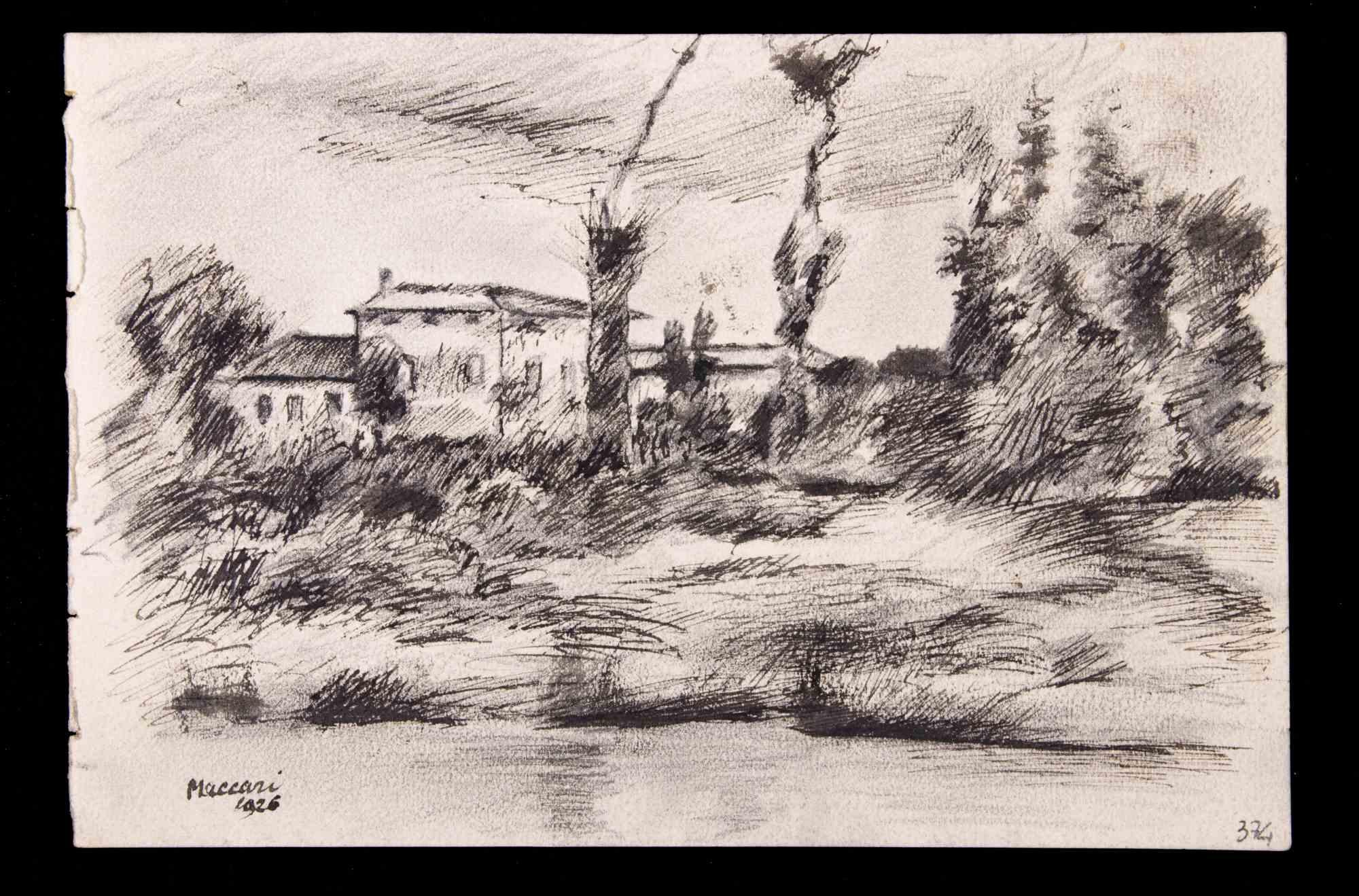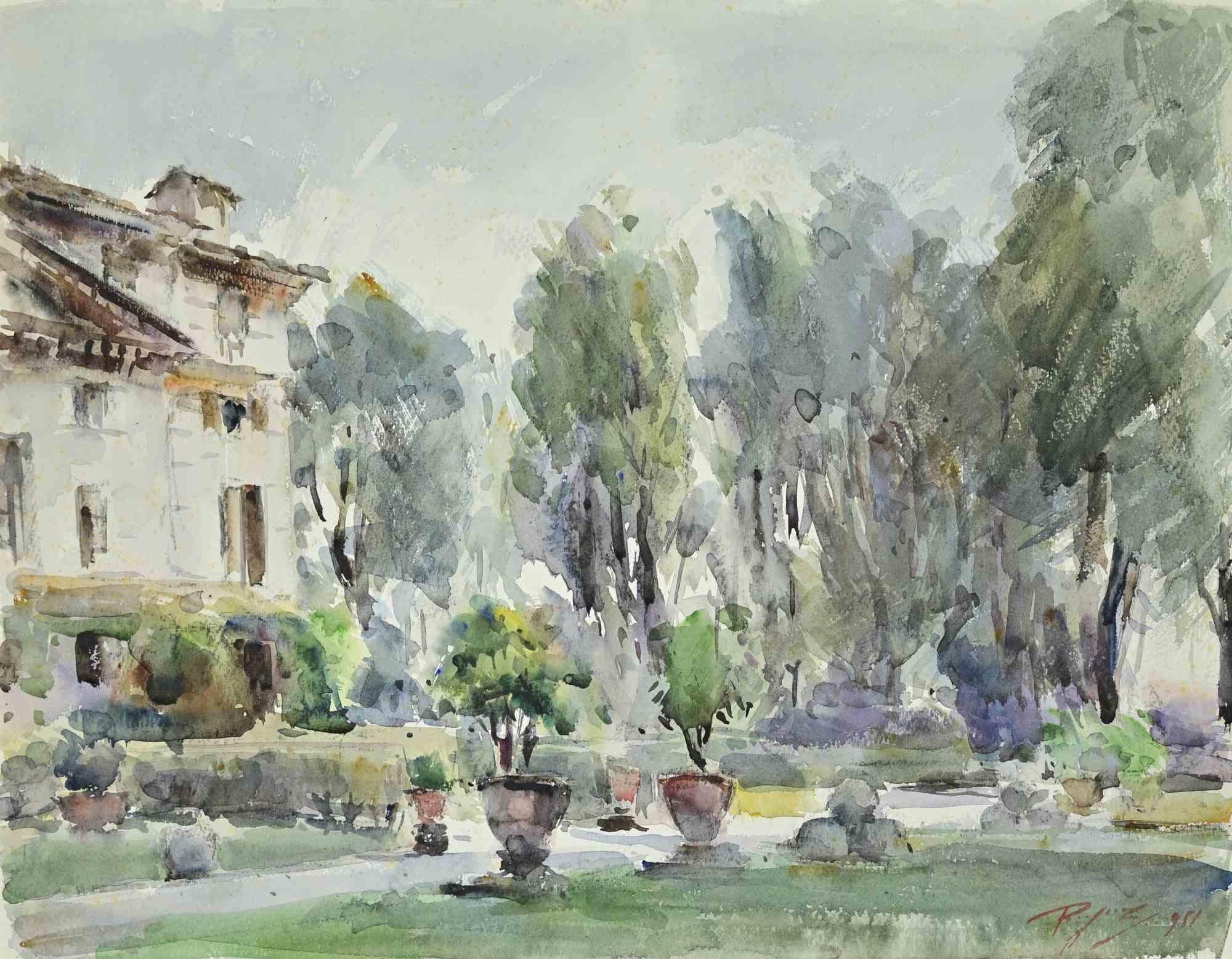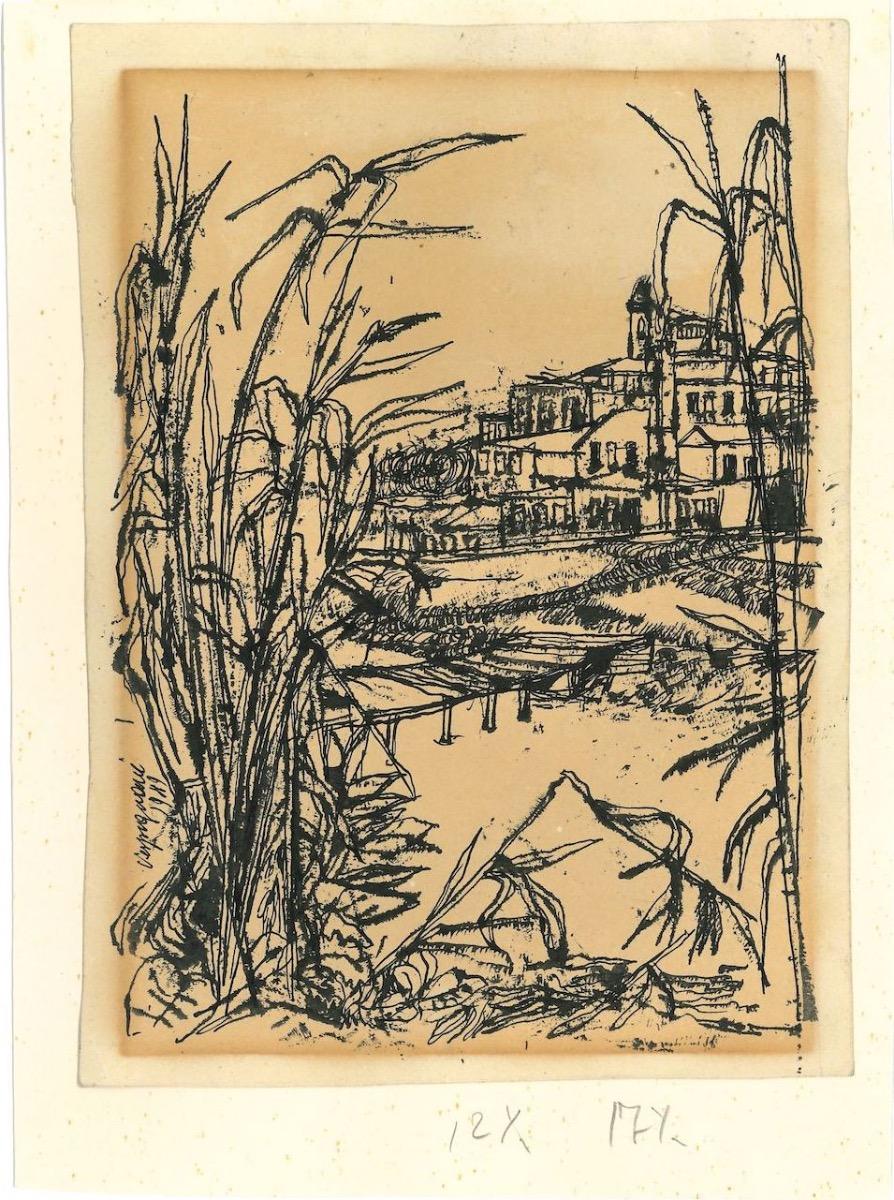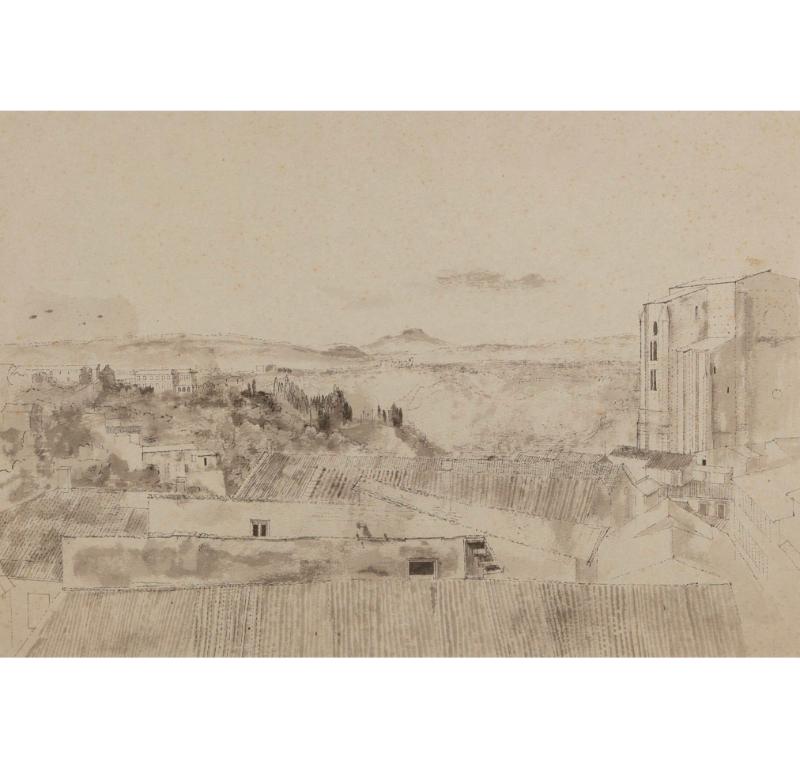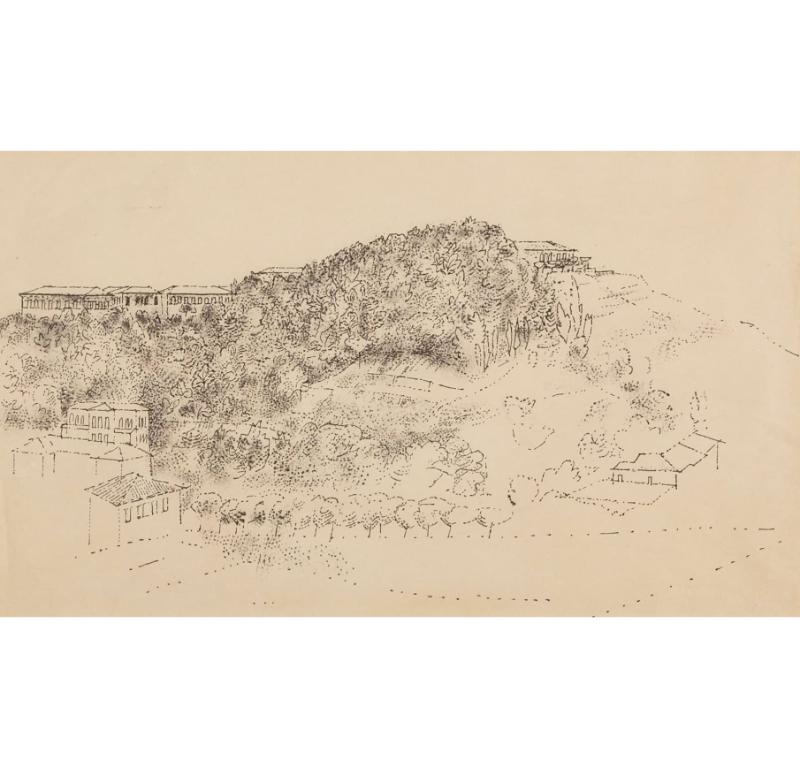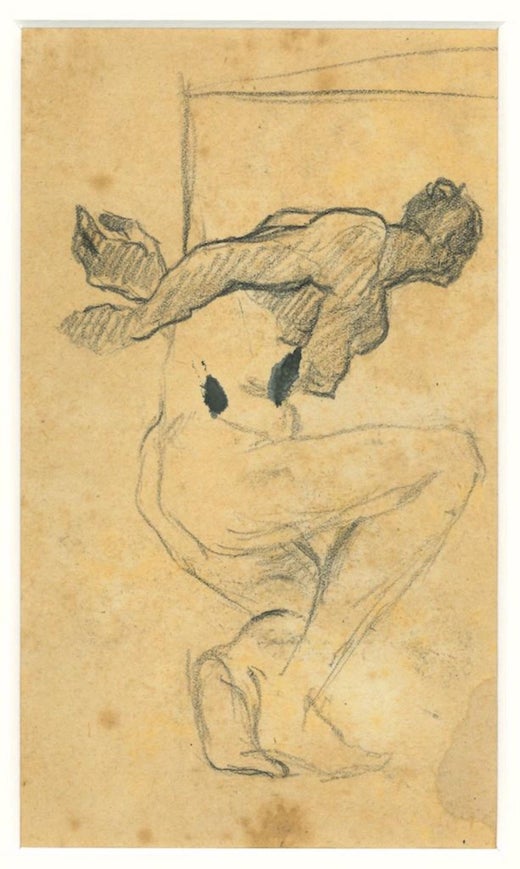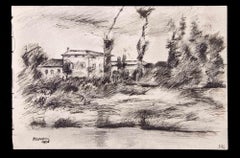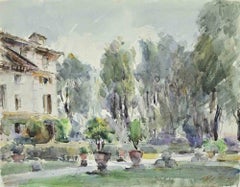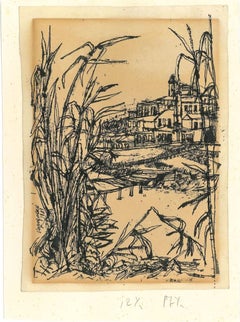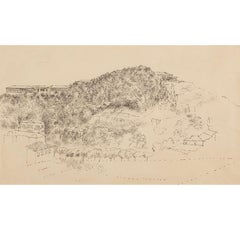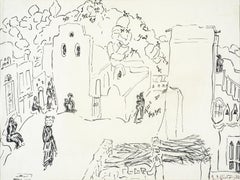Items Similar to Villa Medici / Rome - Ink Drawing by Beppe Guzzi - 1949
Want more images or videos?
Request additional images or videos from the seller
1 of 5
Beppe GuzziVilla Medici / Rome - Ink Drawing by Beppe Guzzi - 19491949
1949
$1,015.82
£752.01
€850
CA$1,405.64
A$1,549.45
CHF 810.75
MX$19,011.29
NOK 10,205.70
SEK 9,543.94
DKK 6,471.90
About the Item
Beautiful Ink drawing by Beppe Guzzi, representing the famous Villa Medici in Rome.
Good conditions.
- Creator:Beppe Guzzi (1902 - 1982, Italian)
- Creation Year:1949
- Dimensions:Height: 14.18 in (36 cm)Width: 17.72 in (45 cm)Depth: 0.04 in (1 mm)
- Medium:
- Period:
- Condition:Insurance may be requested by customers as additional service, contact us for more information.
- Gallery Location:Roma, IT
- Reference Number:Seller: J-517101stDibs: LU65034312912
Beppe Guzzi
Beppe Guzzi was an Italian painter. In 1913, he settled in Livorno, where he began to become passionate about painting. In 1920, he was among the founders of the Labronico Group. Guzzi was self-taught, his first personal exhibition took place in the Bottega d'Arte in Livorno in 1924. Guzzi represents the famous Villa Medici in Rome.
About the Seller
4.9
Platinum Seller
Premium sellers with a 4.7+ rating and 24-hour response times
1stDibs seller since 2017
7,690 sales on 1stDibs
Typical response time: 3 hours
- ShippingRetrieving quote...Shipping from: Roma, Italy
- Return Policy
Authenticity Guarantee
In the unlikely event there’s an issue with an item’s authenticity, contact us within 1 year for a full refund. DetailsMoney-Back Guarantee
If your item is not as described, is damaged in transit, or does not arrive, contact us within 7 days for a full refund. Details24-Hour Cancellation
You have a 24-hour grace period in which to reconsider your purchase, with no questions asked.Vetted Professional Sellers
Our world-class sellers must adhere to strict standards for service and quality, maintaining the integrity of our listings.Price-Match Guarantee
If you find that a seller listed the same item for a lower price elsewhere, we’ll match it.Trusted Global Delivery
Our best-in-class carrier network provides specialized shipping options worldwide, including custom delivery.More From This Seller
View AllLandscape - Drawing by Mino Maccari - 1926
By Mino Maccari
Located in Roma, IT
Landscape is a china ink Drawing realized by Mino Maccari (1924-1989) in 1926.
Hand signed and dated on the lower margin.
Good condition on a yellowed paper.
Mino Maccari (Siena, ...
Category
1920s Modern Figurative Drawings and Watercolors
Materials
Ink
View of Villa Strà sul Brenta - Drawing by Carlo Ravagnan - 1959
Located in Roma, IT
Watercolor on heavy paper realized by Carlo Ravagnan in 1959.
Hand signed and dated lower right.
Excellent condition.
Carlo Ravagnan was born in Udine on September 4, 1911, died i...
Category
1950s Contemporary Figurative Drawings and Watercolors
Materials
Watercolor
Landscape - China ink Drawing by Renzo Vespignani - 1949
By Renzo Vespignani
Located in Roma, IT
Landscape is an original drawing in China ink on paper realized in 1949 by Renzo Vespignani.
Hand-signed on the lower left and date.
Applied on a Passepartout: 21 x 15.5 cm.
Very...
Category
1940s Modern Landscape Drawings and Watercolors
Materials
Ink
Study for the Painting "Paesaggio Marino" - Ink Drawing by Renato Paresce
By Renato Paresce
Located in Roma, IT
Image dimensions: 17,6x10,5
Signed in the bottom right corner.
Passepartout included : 31 x 23 cm.
Very good conditions.
Category
1930s Landscape Drawings and Watercolors
Materials
Ink
View of Rome - Original Pen Drawing on Paper by Luigi Montanarini - 1947
By Luigi Montanarini
Located in Roma, IT
View of Rome is an original drawing in pen realized by Luigi Montanarini in 1947.
Hand-signed by the artist on the lower right margin.
Passepartout: 48.5 x 65
Good condition excep...
Category
1940s Figurative Drawings and Watercolors
Materials
Pen
Rome, Ponte Milvio - Original Drawing attr. to Giulio Zek - 1960s
Located in Roma, IT
Rome, Ponte Milvio is an original pen drawing attribute to Giulio Zek, and realized in the early 1960s.
The artwork is in good conditions on a cream colo...
Category
1960s Figurative Drawings and Watercolors
Materials
Paper, Pen
You May Also Like
Italian Scene, Pen and Ink with Wash Painting by Reginald Brill, 1950s circa
By Reginald Brill
Located in Kingsclere, GB
Italian Scene, Pen and Ink with Wash Painting by Reginald Brill, 1950s circa
Additional information:
Medium: Pen and ink with wash
33 x 48.3 cm
13 x 19 in
Reginald " Reggie" Brill was a versastile 20th century artist and teacher.
Brill was born in London in 1902 and spent his early childhood there and in Yorkshire. By the time of the First World War, at the age of 13, he was living in lodgings in London, working in a City office and attending St Martins School of Art in the evenings. Considering his lack of education, winning a scholarship to The Slade (now part of University College London) in 1921 where he studied under Henry Tonks for three years, was a huge achievement.
On leaving The Slade he found patronage in Lincolnshire, but by the time of the General Strike (1926) he had returned to London and was working on Lansbury's Labour Weekly. He married Rosalie, also an artist, and in 1927 won the Prix de Rome in Decorative Painting. Following two years at The British School in Rome, Brill went to teach at Blackheath School of Art. During 1930 he spent three months painting in Egypt and it was there that he met Col. T G Gayer-Anderson, one of the twin brothers who were to bequeath The Little Hall in Lavenham as a hostel for art students. It was there that Brill retired to act as warden, thus continuing his nurturing of art students until his death in 1972.
Brill took up his appointment at The School of Art, Kingston upon Thames in January 1934. It was situated in the Technical Institute (Kingston Hall Road) and Brill found it bohemian and disorganised. He proceeded to inject enthusiasm, order and discipline. Within 5 years of his appointment a purpose-built School of Art was opened in Knights Park. It remained open throughout the war and by 1945 there was a waiting list for places. Under the skilled and totally dedicated direction of Brill, Kingston School of Art became established with national reputation for excellence. In 1961 Sir Charles Wheeler opened the new building at Knights Park. Costing £100,000, this more than doubled the size of the Art School.
Brill, was a well-known figure in Kingston. His eloquence made him popular as a guest speaker and his promotion of Art and Design stretched well beyond the doors of Knights Park. Apart from establishing two of the main buildings which makeup what is now known as the Faculty of Design, one of the most visible local contributions he made was the setting up of a topographical collection of paintings depicting Kingston, which has since become known as The Brill Collection at Kingston Museum. Brill gained huge respect and admiration from the hundreds of pupils who studied at Kingston during his 30-year leadership.
He published two books, Modern Painting 1946 and Art as a Career 1962, both bearing a strong educational angle. He regularly exhibited along with leading artists of his era at The Royal Academy, both his paintings and his acutely observed drawings. All the while he was a prolific artist, although reading his diaries, intensely self-critical. His perfectionism, acute powers of observation and relentless research can be seen in his drawings, which via the media and methods he explored throughout his life reflect mid 20th century British Art at its most typical. His major series of work, known as 'The Martyrdom of Man', was carried on in parallel to his career as a teacher. These paintings reflect his care for fellow man and depict people at work, e.g., The Operation, The Jury, Linemen, Waiting Room and Rest, which recently sold at Sotheby’s and was specially restored for The Brill Retrospective. His smaller works also play with the theme of everyday events and communication amongst people, such as The Bull Ring and Market Place paintings.
Brill's name is associated particularly with human figure compositions, but he also worked on landscapes, portraits and details of plants, animals, interiors etc. As one would expect he moved from one media to another, and his unusual hand painted and cut paper mosaics...
Category
20th Century Landscape Paintings
Materials
Pen
Italian Landscape, Pen Painting by Reginald Brill, 1950 circa
By Reginald Brill
Located in Kingsclere, GB
Italian Landscape, Pen Painting by Reginald Brill, 1950 circa
Additional information:
Medium: Ink
20 x 34 cm
7 7/8 x 13 3/8 in
Reginald " Reggie" Brill was a versastile 20th century artist and teacher.
Brill was born in London in 1902 and spent his early childhood there and in Yorkshire. By the time of the First World War, at the age of 13, he was living in lodgings in London, working in a City office and attending St Martins School of Art in the evenings. Considering his lack of education, winning a scholarship to The Slade (now part of University College London) in 1921 where he studied under Henry Tonks for three years, was a huge achievement.
On leaving The Slade he found patronage in Lincolnshire, but by the time of the General Strike (1926) he had returned to London and was working on Lansbury's Labour Weekly. He married Rosalie, also an artist, and in 1927 won the Prix de Rome in Decorative Painting. Following two years at The British School in Rome, Brill went to teach at Blackheath School of Art. During 1930 he spent three months painting in Egypt and it was there that he met Col. T G Gayer-Anderson, one of the twin brothers who were to bequeath The Little Hall in Lavenham as a hostel for art students. It was there that Brill retired to act as warden, thus continuing his nurturing of art students until his death in 1972.
Brill took up his appointment at The School of Art, Kingston upon Thames in January 1934. It was situated in the Technical Institute (Kingston Hall Road) and Brill found it bohemian and disorganised. He proceeded to inject enthusiasm, order and discipline. Within 5 years of his appointment a purpose-built School of Art was opened in Knights Park. It remained open throughout the war and by 1945 there was a waiting list for places. Under the skilled and totally dedicated direction of Brill, Kingston School of Art became established with national reputation for excellence. In 1961 Sir Charles Wheeler opened the new building at Knights Park. Costing £100,000, this more than doubled the size of the Art School.
Brill, was a well-known figure in Kingston. His eloquence made him popular as a guest speaker and his promotion of Art and Design stretched well beyond the doors of Knights Park. Apart from establishing two of the main buildings which makeup what is now known as the Faculty of Design, one of the most visible local contributions he made was the setting up of a topographical collection of paintings depicting Kingston, which has since become known as The Brill Collection at Kingston Museum. Brill gained huge respect and admiration from the hundreds of pupils who studied at Kingston during his 30-year leadership.
He published two books, Modern Painting 1946 and Art as a Career 1962, both bearing a strong educational angle. He regularly exhibited along with leading artists of his era at The Royal Academy, both his paintings and his acutely observed drawings. All the while he was a prolific artist, although reading his diaries, intensely self-critical. His perfectionism, acute powers of observation and relentless research can be seen in his drawings, which via the media and methods he explored throughout his life reflect mid 20th century British Art at its most typical. His major series of work, known as 'The Martyrdom of Man', was carried on in parallel to his career as a teacher. These paintings reflect his care for fellow man and depict people at work, e.g., The Operation, The Jury, Linemen, Waiting Room and Rest, which recently sold at Sotheby’s and was specially restored for The Brill Retrospective. His smaller works also play with the theme of everyday events and communication amongst people, such as The Bull Ring and Market Place paintings.
Brill's name is associated particularly with human figure compositions, but he also worked on landscapes, portraits and details of plants, animals, interiors etc. As one would expect he moved from one media to another, and his unusual hand painted and cut paper mosaics...
Category
20th Century Landscape Paintings
Materials
Pen
"Villageoise" Inks on Paper Painting 14" x 24" in by Inji Efflatoun
By Inji Efflatoun
Located in Culver City, CA
"Villageoise" Inks on Paper Painting 14" x 24" in by Inji Efflatoun
Signed and dated
Inji Eflatoun pursued free studies in art. Since 1942, she has participated in the exhibitions...
Category
20th Century Post-War Landscape Drawings and Watercolors
Materials
Ink, Archival Paper
Vintage Italian Watercolor and Ink - Outskirts of Italian Village
Located in Houston, TX
Warm and lively watercolor and ink painting of a small group of people on the fringes of a small Italian village, circa 1970. Artist unknown.
Original artwork on paper displayed on ...
Category
1960s Landscape Drawings and Watercolors
Materials
Paper, Ink, Watercolor
Black and white Italian countryside etching made by the leader of print in Italy
By Federica Galli
Located in Milan, IT
Cascina Madera,
Ref. 421
Original etching, signed and numbered. Limited edition of 90.
Federica Galli was one of Italy's leading contemporary etchers.
She achieved this fame because she was able to interpret views, as Milan and Venice, landscapes and architecture with a poetic and original eye.
Moreover she had the foresight to portray the beauty of the great Italian trees...
Category
1980s Realist Landscape Prints
Materials
Etching
Provençal Scene in Ink
By Jean-Baptiste Grancher
Located in Houston, TX
Emotive mid-century ink drawing on paper of a rurale vista in Provence by French artist, Jean Baptiste Grancher, circa 1960.
Original artwork on paper displayed on a white mat with ...
Category
1960s Landscape Drawings and Watercolors
Materials
Paper, Ink
